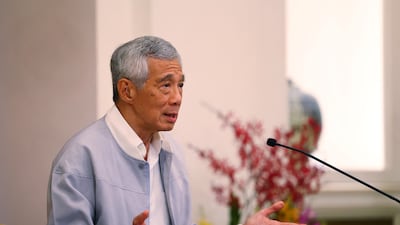“Only the paranoid survive.” Singapore’s Prime Minister Lee Hsien Loong is known for often quoting the dictum of Intel’s founder Andy Grove. But after a recent trio of scandals, he could be forgiven for feeling particularly wary and mistrustful.
Last week, Transport Minister S Iswaran was arrested, had his passport impounded, and was told to take a leave of absence – the first time a cabinet member had been investigated over graft allegations since 1986. On Monday, the Speaker of the city-state’s parliament, Tan Chuan-Jin, and a fellow lawmaker from the long-ruling People’s Action Party (PAP) resigned over an extramarital affair. And only a couple of weeks ago, a government review had to be carried out after the country’s opposition asked if Foreign Minister Vivian Balakrishnan and Law and Home Affairs Minister K Shanmugam were underpaying for the government-owned colonial-era bungalows they were renting.
In the case of the last two, no evidence of wrongdoing was found. Mr Iswaran remains innocent until proven guilty. And there is no illegality in individuals having complicated personal lives. But the confluence of stories of alleged and actual misconduct has not just damaged the immaculately technocratic image the PAP has always liked to project, with analysts warning it could negatively affect foreign investor sentiment. It has also been reported that it has sent “shockwaves” through the party – which has been in power continuously since 1959 – and could even delay Mr Lee’s plan to hand over soon to his successor, Finance Minister Lawrence Wong.
This may surprise those who observe the regularity and decorum of Singapore politics, and see these instances as mere trifles compared to the genuine scandals and ruckuses in other parliaments. In Britain, for instance, several members of the Houses of Commons and Lords went to jail over an expenses investigation just over a decade ago, while fisticuffs have broken out in so many assemblies around the world that Wikipedia has a surprisingly long entry devoted exclusively to “legislative violence”.

But as successful as Singapore is – and it is looked up to as a role model by many smaller nations, particularly those that aspire to become “knowledge economies” – underneath there is a sense of fragility, and even an existential dread. One of the country’s leading intellectuals, Kishore Mahbubani, wrote in his 2015 book, Can Singapore Survive? that the “question that Singaporeans have to wrestle with [is] can we survive as an independent city-state? History is not comforting”. The country’s founding leader, Mr Lee’s father Lee Kuan Yew, once said: “When I project myself forward for 100 years for Singapore, I cannot tell you that it will exist.”
The country’s journey from “Third World to First”, as the second volume of the elder Mr Lee’s memoirs was titled, was astounding. But it was built primarily on two foundations: the grip that Mr Lee senior exerted over every aspect of Singapore; and his vehement insistence that they should aim to be the cleanest and most efficient government machine on the globe.
This is why any suggestion of abuse of power or graft is so harmful. (I should reiterate at this point that Mr Iswaran may be entirely innocent.) Prime Minister Lee only has to look at the history of some his country’s neighbours to be all too aware of the baleful effects of corruption: once it creeps in and becomes systemic, it becomes a Sisyphean task to eradicate it.
Malaysia and Indonesia, for example, remain wonderful places to live and do business. Only last Friday, Elon Musk agreed to set up a Tesla head office in Malaysia, and Indonesia broke its own records for foreign investment last year. However, both countries are having to deal with the issue of corruption.
Malaysia’s Prime Minister Anwar Ibrahim says he is cracking down hard on corruption – an issue he has campaigned on for over 20 years – while Indonesia’s President Joko Widodo has said that it is the most complicated problem his country faces. Both leaders have strong reformist, pragmatic credentials. I have no doubt they mean what they say, such a task takes time and effort.

And much effort has indeed been made in both countries towards this end. In Indonesia, for example, allegations of vote buying during elections over the years have somewhat diminished, and the US non-profit Freedom House has even praised the “impressive democratic gains” the country has made since the fall of Gen Suharto in 1998.
Yet the challenges are undeniable.
In Malaysia, no one will dispute that systemic corruption has been an issue since the 1980s. And this despite the fact that the example set at the top was impeccable. The country’s first prime minister, Tunku Abdul Rahman, nearly impoverished himself spending his own money on the party he led; the second, Tun Abdul Razak, refused to have a swimming pool built at his official residence because he thought it too extravagant; and the third, Tun Hussein Onn, had such a strong sense of propriety that the story goes that if a relative ever came to him with a proposal for a government contract, he put it straight in the bin.
All of which goes to show that a reputation for being clean is priceless, and once the genie of corruption is out of the bottle, it can be very challenging to contain. So Singapore’s government is right to take these scandals very seriously indeed, even if the reactions do strike some outsiders as a bit “paranoid” and over-the-top.
The country’s former foreign minister George Yeo once wrote: “The vulnerability of Singapore is not a new theme. Lee Kuan Yew spoke of it constantly.” For Mr Lee, he wrote, “the response is leadership, tough leadership”. Mr Yeo’s conclusion? “If that is lost, all is lost.”


